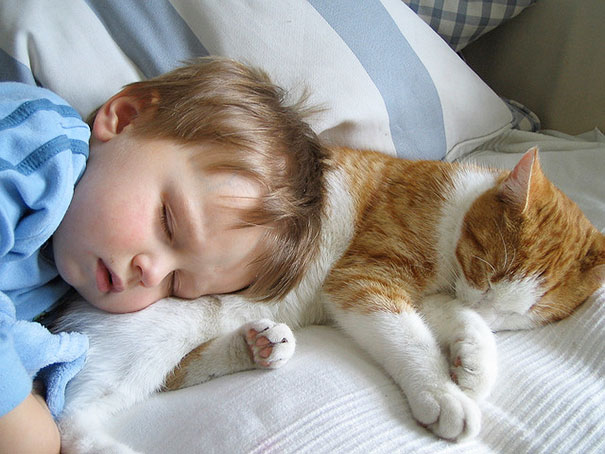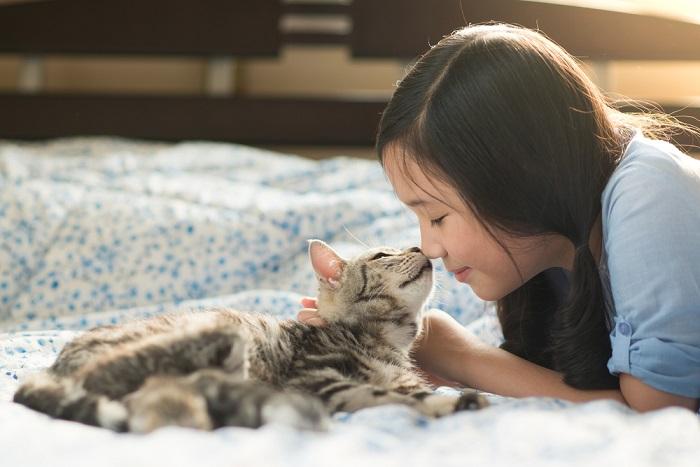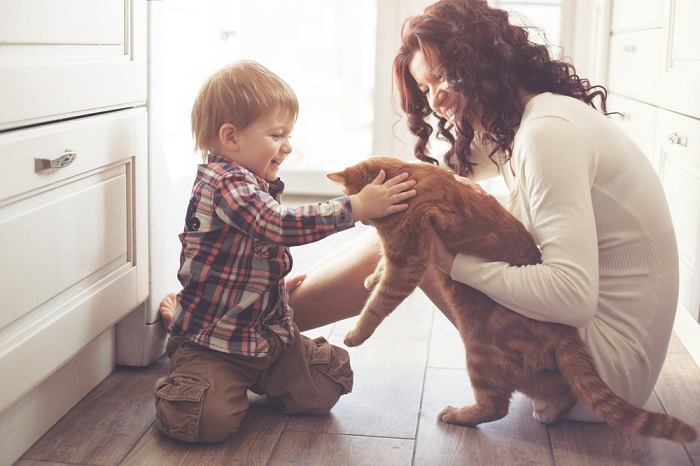
Every person who has had the opportunity and the privilege to grow up with a cat mostly remembers all that wonderful cuddling and play time. And while it’s always funny and interesting to watch your kid play and spend time with their kitty companion, that combination of a young child and willful cat can sometimes turn into a disaster.
In order keep both your child and your pet safe, it’s important to set up some rules and teach your child how to behave towards animals because not only will you raise a responsible and animal-loving grown-up but you’ll also end up with some very happy pets.
Teach Your Child How to Pet the Cat

Every cat owner knows that cats aren’t the most tolerant creatures, so it’s important to teach your child how to pet a cat in a way that is enjoyable. My daughter was already used to our older cat, Nini, and she knew that she’s only supposed to pet her only on her back, shoulders, neck and top of her head.
However, when we introduced her to a new kitten, Lila, when she was three, I still had to supervise their interactions in the beginning and make sure my daughter doesn’t get scratched if she pulls the kitten’s tail or simply annoys it by poking it and pulling its fur only like little kids can. Make sure you teach your child to use soft, gentle open-handed strokes and teach them to avoid cat’s belly, tail or paws. Parenting advice is particularly important when teaching your toddler safe play with cats
Keep the Play Calm and Gentle

Cats are extremely sensitive to noise and movement so over-excited children very often scare them. It took my daughter a while to figure out that our 8-year-old cat doesn’t enjoy all that shouting and screaming so when Lila came along, my daughter already knew that when she wants to play with her furry friends she needs to calm down a bit.
The curious thing is, these days, when my 4-year-old daughter wants some alone time, she goes to her comfortable kids teepee where Lila very often joins her so they cuddle together or calmly play in their safe and peaceful place. Also, make sure your child knows not to use its hand as a toy in order to avoid any accidental scratches and bites.
Allow the Cat Some Alone Time

Cats really enjoy their alone time, so make sure you child is aware of this and if the cat is hiding underneath something or is high up somewhere, the cat should be left alone. If your child corners or pulls the cat, it can only lead to your kid getting scratched or bitten.
My daughter knows that when the cats are underneath the couch that it’s their nap time and she should wait for them to come out on their own. If she really wants to play with them, she uses toys or treats to persuade them to come out and play.
Also, to make sure your cat is living a stress-free life in your home, make sure it has a place to go for some private time where no one can disturb it.
Set Some Ground Rules

In order to definitely avoid any disasters such as scratches, bites, tears, or hissing, loud meowing and ripped out fur, make sure your kids have some ground rules like no pulling the cat’s tail, whiskers or ears, or chasing the cat and disturbing it while it sleeps. For example, in our house, cats are not to be touched in the kitchen, because this is where they get to eat and use their toilet in peace.
So while playing together can be super fun and rewarding both for your child and your kitten, it’s really important they spend this time safely and in harmony. By teaching your child how to behave around cats not only will your child have plenty of fun, but you’ll make your cat’s life enjoyable too.








Hi, I have two cats, a 12 year old female and a 15 year old male. My male cat never gets along with the female. He constantly attacks her while she’s sleeping, eating, in the litter box, whenever he has a chance to attack he does. Need ideas please !!
Hi Luis,
The first thing I’d think about is making sure that both your male and female cat have their own territory. Do your cats have personal spaces where they can eat, sleep, and use the litter box alone? Neither of your cats should have to compete for resources and space. Ideally, those designated spaces should include some elevated hideouts and perches. Vertical territory can be life-changing for bullied cats. You might even install and program an electronic cat door to give your female cat exclusive access to a certain room.
Here’s an in-depth guide to resolving social conflict between cats:
https://www.psychologytoday.com/us/blog/decoding-your-pet/201502/resolving-social-conflict-between-familiar-cats
Best,
Mallory